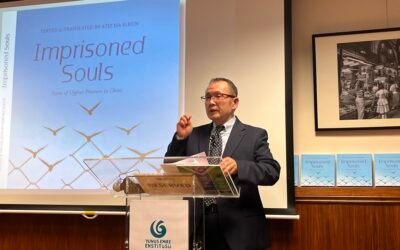The CCP would like to use Taiwanese Quanzhen Taoists for its purposes. However, it encounters an obstacle in the very structure of Taiwan’s Taoism.
by Mattias Swenson Daly
Article 3 of 4. Read article 1 and article 2.
Note: “Bitter Winter” publishes, with the authorization of the author, excerpts from the new book “Infiltrating the Tao: China’s Influence Operations Targeting Quanzhen Taoist Communities in Taiwan and the West,” published by Religioscope, Fribourg (Switzerland), 2025.

For years the CCP has openly taken advantage of a small number of Taiwanese citizens’ enthusiasm for Quanzhen Taoism, corralling religious pilgrims from across the strait into meetings and ceremonies serving up heavy doses of ideology meant to convert these “Taiwanese compatriots” to its cause. According to several people who spoke to “Religioscope” for this paper, the CCP has also used these interactions as an opportunity to lure Taiwanese visitors closer into its orbit by offering a variety of enticements.
On condition of anonymity, a Taiwanese academic who occasionally participates in cross-strait religious fora told “Religioscope” that reimbursed round-trip plane tickets, free accommodation, travel, and dining within China, as well as “travel stipends” ranging from thousands to tens of thousands of Chinese yuan are the norm for the more politicized events, with perks on the higher end reserved for Taiwanese visitors the UFWD considers especially useful. Political scientist Kuei-Min Chang echoes this figure, writing, “So-called ‘travel stipends,’ the function of which is more akin to ‘payments for service,’ sometimes reach to hundreds of thousand Taiwan dollars” (Chang, Kuei-min, “Deconstructing the China Factor: The Institutional Logics of Cross-Strait Popular Religious Exchanges,” Taiwanese Journal of Political Science [國立臺灣大學政治科學論叢] 98,[2023], 129). That cross-strait Quanzhen Taoist dialogues are important enough to be featured on United Front’s own website may give the impression that it believes these efforts are paying off (see United Front Work Department of CPC Central Committee 中共中央統一戰線工作部, “Welcome Home! Members of the Taoist World from Both Sides of the Strait Gather on Mount Wudang in Fellowship to Pay Their Respects to the Ancestors!” [欢迎回家!两岸道教界齐聚武当山谒祖联谊], published April 25, 2023, accessed February 7, 2025).
However, it is worth questioning whether the Chinese government’s eagerness to gloat about influence operations in its propaganda actually means that those operations are succeeding. Addressing American readers, “The Atlantic”’s Michael Schuman wrote, “With China, things aren’t always what they seem. Many apparent Chinese strengths—including education, manufacturing, and technology—aren’t quite as strong as many Americans believe… something policy-makers and pundits in Washington should keep in mind as they fret over Beijing’s ostensibly growing might” (Schuman, Michael, “Don’t Believe the China Hype: When It Comes to Assessing Chinese Power, Things Aren’t Always as They Seem,” “The Atlantic,” June 16, 2020, accessed February 7, 2025).
In the spirit of this advice, this section focuses on two factors mitigating the likelihood of Taiwanese Quanzhen Taoism becoming a tool of the UFWD. The first is that intrinsic structural features of “Taiwanized” Quanzhen Taoism may make it largely immune to the United Front’s attempts to influence the religion, and the second is that the Chinese government may not actually be making concerted efforts to control or pervasively influence Quanzhen’s Taiwanese followers.
It is difficult to overstate just how different Taiwanese Quanzhen Taoism is from the institutionalized version of the sect superintended by the National Religious Affairs Administration (NRAA) in China. Signaling just how strictly the NRAA monitors Chinese Taoists, in early 2023 it unveiled “the Buddhist and Taoist Clerical Personnel Information Query System” (National Religious Affairs Administration. “Religious Worker Information Query” [宗教教职人员信息查询], accessed February 7, 2025).
According to the “China Daily,” the PRC’s flagship state-run English-language newspaper, the query system holds “information on religious personnel, including their legal name, gender, photo, religious title, sect and registration number,” “provides an authoritative and credible channel for the public to verify the identity of religious personnel,” and “will help the [official religious] associations perform their statutory duties, strengthen the management of Buddhist and Taoist religious personnel, and improve their self-restraint” (Yang, Zekun, “Public Database to Help Verify Accredited Monks,” “China Daily,” updated February 2, 2023, accessed February 7, 2025).
While the query system ostensibly exists to help Chinese citizens avoid giving donations to conmen posing as Buddhists or Taoists, He Yuyan of “Bitter Winter” writes, “The new system, however, has ulterior aims… Those [monks and nuns] who refuse to join the associations and operate independently, including in the ‘gray market’ of unregistered temples, are branded as ‘fake’ clergy. The CCP can also further control monks and priests by threatening them with being removed from the database” (He, Yuyan, “The ‘Buddhist and Taoist Clergy Database,’ Another CCP Imposture,” “Bitter Winter,” March 15, 2023, accessed February 7, 2025).

Illustrating how much freedom Taiwanese Quanzhen Taoists enjoy relative to their PRC counterparts, such a database would be impossible to establish in Taiwan. The Taiwanese government does not have an office that closely monitors or supervises religious organizations. The guarantee of religious freedom in the country’s constitution is taken seriously, barriers to establishing temples and associations are extremely low, clergy are not required to register with the government, and there exists no legal definition of what constitutes a “real” or “fake” Taoist.
At the same time, there are no widely recognized formal associations in the Taiwanese Quanzhen community. Instead of belonging to a centralized organization or even an informal hierarchy, most Quanzhen temples are either fully independent or else informally affiliated with a small number of friendly temples, with which they occasionally collaborate to perform large ceremonies. This means that there is no institution that can confer or revoke religious legitimacy via certificates or rosters, much less advance or undermine individual Taoists’ careers by granting or denying access to finances, publicity, real estate, or other forms of support. Even if the United Front were to thoroughly infiltrate (or establish) an association of Quanzhen Taoists in Taiwan, it would have little to no leverage over any monks, nuns, and laypeople who rejected its agenda.
Additionally, as many of the interviewees’ statements quoted throughout this paper suggest, the Taiwanese Quanzhen community is both fractured and fractious. Due to the community’s small size, most Taiwanese Quanzhen Taoists are aware of each other’s temples, yet few of them actually share close links in terms of the lineages of spiritual transmission they joined in China. The interviewees who spoke to “Religioscope” for this paper received their religious education in provinces scattered all over the PRC, including Fujian, Hubei, Liaoning, Shandong, Sichuan, and Zhejiang.
As a result of this geographic disparity, the Chinese monks and nuns who initiated these Taiwanese believers into Quanzhen Taoism may not have even heard of one another, making it next to impossible for them to try to bring their Taiwanese disciples closer together. This is not the only way China’s vast geography influences Quanzhen Taoism in Taiwan; because they learned to play regional versions of the sect’s liturgical music and chants, many of Taiwan’s clergy have no way of joining together to conduct rituals. Furthermore, showing how little cohesion there is in this community, even among those who did learn similar liturgies, clashes of personalities and divergent ideas of what constitutes “authentic” Quanzhen Taoism can lead to permanent rifts between individual Taoists as well as their flocks of students. One such rift was brought to the fore when an interviewee mentioned the name of another Taoist trained in the same Sichuanese liturgical style as he was, only to bellow that he does not interact with the other monk because “he does not engage in honest work.”
Notably, it is not only Taiwanese Quanzhen Taoists and their Chinese religious preceptors who have shied away from attempting to create a unified, coherent community in Taiwan. With their stated goal of fashioning Taoism into a tool that will help the PRC government pursue its political agendas at home and abroad, it seems logical that the UFWD and the CTA would stand to benefit by investing in the creation of a well-organized community of Taiwanese Quanzhen Taoists. Such a community, one might reason, would be far easier to mobilize as a surrogate voice for the CCP than the current hodgepodge of autonomous Quanzhen temples operating independently of one another. However, “Religioscope” came across no evidence or anecdotes suggesting that arms of the Chinese government have pursued such a goal. Quite the opposite, multiple interviewees scoffed exasperatedly at questions about how the Chinese side might be investing in the Quanzhen sect in Taiwan. It seems unlikely that these were calculated answers meant to obscure the flow of Chinese funding or institutional support into the hands of Taiwanese Quanzhen Taoists, as the interviewees clearly felt that they were being deprived, and seemed willing to accept donations if they were actually offered.

Most vocal on these issues was Interviewee H, who called three decades of government-sponsored cross-strait Taoist exchanges in China “a complete waste of time” comprising an endless series of “pointless banquets, photo-ops, and speeches” that have done nothing to actually promote the religion’s development in Taiwan. When asked if he expected the Chinese government would ever contribute money to assisting Taiwanese Quanzhen Taoism, his answer was an emphatic “no.” Responding to the same question, not only did Interviewee D offer a similar reply, she then elaborated by complaining that even today members of the CTA still view Taiwanese Taoists as people to be solicited for donations, not to be given them. Interviewee J reacted with incredulity to the notion of Taiwanese Quanzhen Taoists receiving funding from China, replying tersely, “Why the heck would they support us?”
Similar reactions arose to questions about the fact of there being no Taiwanese Quanzhen monks or nuns invited to participate in the founding of the World Federation of Taoism in 2023. Regarding this snub, Interviewee G mused, “You [the PRC] so strongly desire to annex our country, and yet you totally lack any understanding of us, it’s bizarre.” As for why the Chinese government does not even try to organize Taiwanese Quanzhen Taoists, Interviewee E offered a plausible explanation: “They’d be incapable of demanding that we do anything for them. After all, Taiwan is just too free.” In the following pages, we will turn to political science research in search of a framework that allows us to make sense of the seeming lack of a coherent strategy in the UFWD’s targeting of Taiwanese religions.

Mattias Swenson Daly is a Kiwi-American researcher, translator, and writer based in Taiwan. His writings and translations span religious, historical, political, and arts topics. One of his translations, Taoist Inner Alchemy: Master Huang Yuanji’s Guide to the Way of Meditation, was published in 2024 through Shambhala Publications. In 2023 he published Ungrounded Certainty: The Methods, Texts, and False History of Sexual Inner Alchemy in the Scholarly Imagination (無中生有:學界想象中的陰陽丹法文本與虛構的歷史), an original monograph written in Chinese, through Shin Wen Feng Printing Company. Prior to living in Taiwan, he spent a decade in China.



